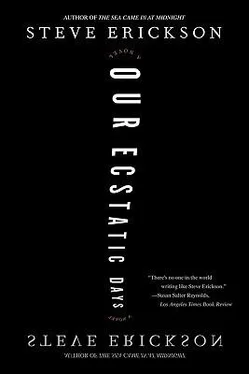You couldn’t have thought of all this ten years ago could you, the girl says to Sara in her mind, with such force of resentment that for a moment she’s sure she said it out loud. But then she realizes the illogic of her own bitterness: of course if Sara had thought of it ten years ago, in all likelihood she would be with someone else
afterward asked What’s missing from the world? and who then never dreamed,
now and they wouldn’t be together at all. “What was that last stop?” the girl finally says in one of the pauses between arguing that now have become longer than the arguing itself. A man sitting across the aisle stares at her; she pulls her coat to her but not too tight, folds her arms across her chest. Actually she really doesn’t hate men. Actually, sometimes they can be easier to deal with than women because everything’s so straightforward in terms of what they want, and it’s true, no getting ’round it, that women are often confounding labyrinths whereas men, they’re always simple sidestreets just calling themselves boulevards. Plus it’s one of the few advantages of the gender that almost none of the men always checking her out is especially keen for her to have his baby. “Chambers,” Sara answers.
“What?”
“Chambers was the last stop.”
Really? We’re that far downtown? The next station won’t be open this time of night. If she gets off at the stop after that, the girl thinks to herself, should she announce it to Sara, or just do it and see if the other follows? A power play of sorts, the act of just deciding to get off the subway: a way to get Sara to tip her hand, Sara who never tips her hand, who hides everything behind her veil of doctoral calm. A power play — but also an opportunity for the therapist to point out the girl is being unduly, provocatively petulant, even for a nineteen-year-old. So she does the grown-up thing. “I want to get off at the next one,” she says. Sara doesn’t answer; so much for mature behavior, the girl snorts to herself. But at the next stop, when the train doors slide open and the girl grabs her radio and walks off, Sara follows, slipping through the doors just as they close behind her.
never dreamed in all her nights of childhood, in all the nights of childhood
It makes the girl feel a bit more in control and she likes that. She knows they’ve been on the train a long time but she’s momentarily surprised anyway, as the two women walk up the steps from the subway, how dark it is and that it’s not still early twilight as it was when they got on. They’re not saying anything now, Sara just following as they cross the intersection and head for the open plaza. There’s an incongruity between the loveliness of the balmy moment and the women’s heavy tension. Sara won’t continue to follow silently much longer if I don’t concede something, the girl thinks, even if it’s nothing more than a kind word of regret; but even that would sound contrite and the girl realizes she’s beyond contrition, beyond concession — that in fact she’s angry: is it over then? Entering the plaza square, her head is filled with things it’s never been filled with before: the sense of betrayal, the sense of having been taken advantage of — she was my therapist, the girl thinks, but perhaps that’s not fair is it, in as how I made that first move, pursuing the romance with the naked aggression of need. Nothing’s more aggressive than need. But there’s that superiority of Sara’s that makes her so insufferable sometimes, that—
“Where are we going?” Sara finally says almost snappishly, Sara who never snaps, Sara of the endless empathy but no true sympathy. Sara who believes that, beyond the point of logical self-exhaustion, sorrow is only an illusion, a collapse of fortitude on the part of the afflicted.
“I want to go up,” the girl answers.
“Up?”
“To the top.”
when a girl dreams all the possibilities of her life in a way she ’ll never do
The older woman looks up. “At this time of night?”
For a moment the prospect seems a salvation to the girl. For a moment the girl is convinced their relationship will survive if Sara just comes with her. Sometimes a moment presents an unexpected, inexplicable test; the girl says, with a sudden burst of enthusiasm, “I know someone who can take us.”
“Who?”
“This man I know.”
“This man you know? What man you know?”
No, the girl thinks, this isn’t the way the conversation is supposed to go. “Someone I’ve been doing some work for at the library. I told you about him.”
“No….”
“I did,” the girl says, almost furious now.
Sara doesn’t answer for a moment. That means she remembers. “I didn’t know you and this man were such friends,” she says with something almost resembling envy; has Sara ever sounded jealous? Is this a positive sign, or the last straw? As though lost in thought, there in the square the older woman begins to walk in small circles, each taking her off somewhere between the fountain and the buildings beyond. “Who is he?”
“I don’t know his name,” the girl says, “Sara, the men are the ones with the penises, remember? Not my sort, and he’s way older than I am—” and stops herself but too late. In the dark Sara
again, and for that reason after he was born, back from Tokyo and living in the
doesn’t even raise her head to this, just laughs one of her quiet, superior little laughs. The girl has no idea what to say now, feels futile about everything. Actually she has no idea how old the man is, but he’s surely younger than Sara. Now the two women have managed to make their way to the edge of the square and Sara leans up against one of the massive walls.
They don’t talk for a while and now it’s all seeming impossible to the girl. She suppresses an urge to turn on her radio, knowing it will be taken as a sign she’s finished, when she’s surprised to hear Sara, looking up at the buildings — and in that voice one can sometimes barely hear, it seems so calm — ask, “He can take us up there?”
“Yes.”
“How far?”
“All the way.”
“Really?”
“Yes.”
“What, does he own it or something?”
Now the girl looks up, leaning back farther until it frightens her and she almost topples. “Really I don’t know that much about him. He’s someone who came into the library and asked me to run a search for him, and in return said he could take me up any time.” Beginning to inwardly fume, she insists, “I know I told you about him.”
Hotel Hamblin about the time the lake first appeared, part of me was actually
“Yes,” Sara admits quietly, “I remember. Well,” she says, “not the part about going up. Have you been up before?”
“Naturally not.”
“Well. You might have. It’s not like you couldn’t have.”
“Well, I haven’t. Have you?”
“I don’t know him, this is your secret friend.”
“He’s not a secret friend. I meant have you ever been up before.”
“No.”
“So let’s go then,” the girl says hopefully.
“Where do we find this person?”
“Well—” and she has to confess he may not exactly have had this time of night in mind. She looks around. The fountain with the bronze frankenstein world in the middle is empty; she thinks of it as a frankenstein world because it looks like parts of two or three worlds stuck together. Now she tries to figure out where he told her and realizes the square is bigger than she expected and that finding him will be more daunting than she anticipated. “Let’s just go over—” and then notices Sara doing it again; it would be just like Sara, the girl thinks, to regard healing buildings as a step up from healing people.
Читать дальше











